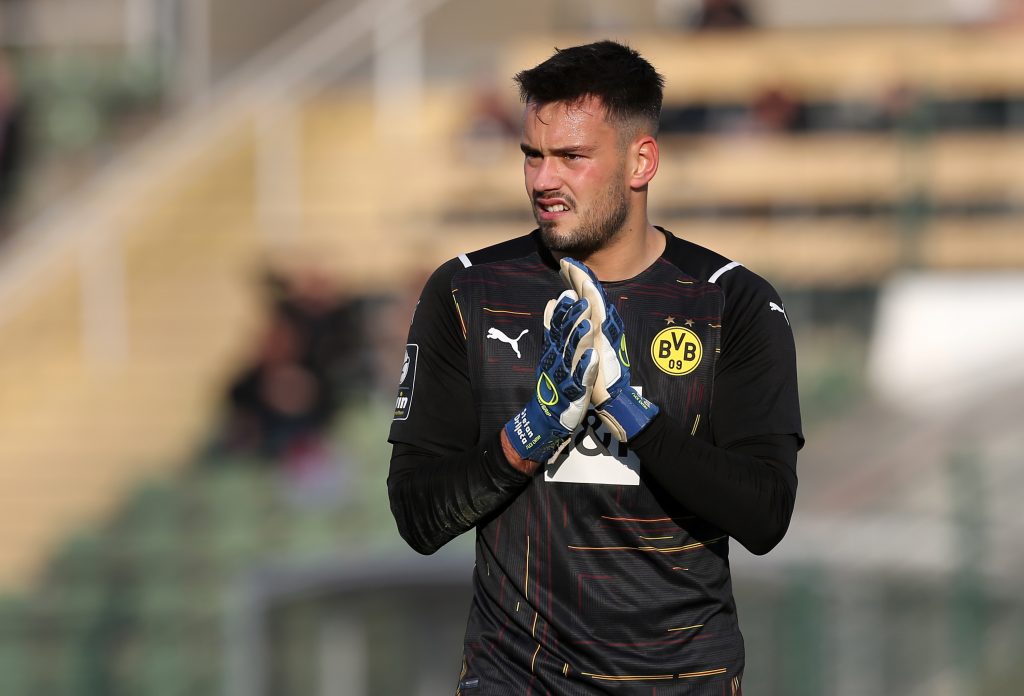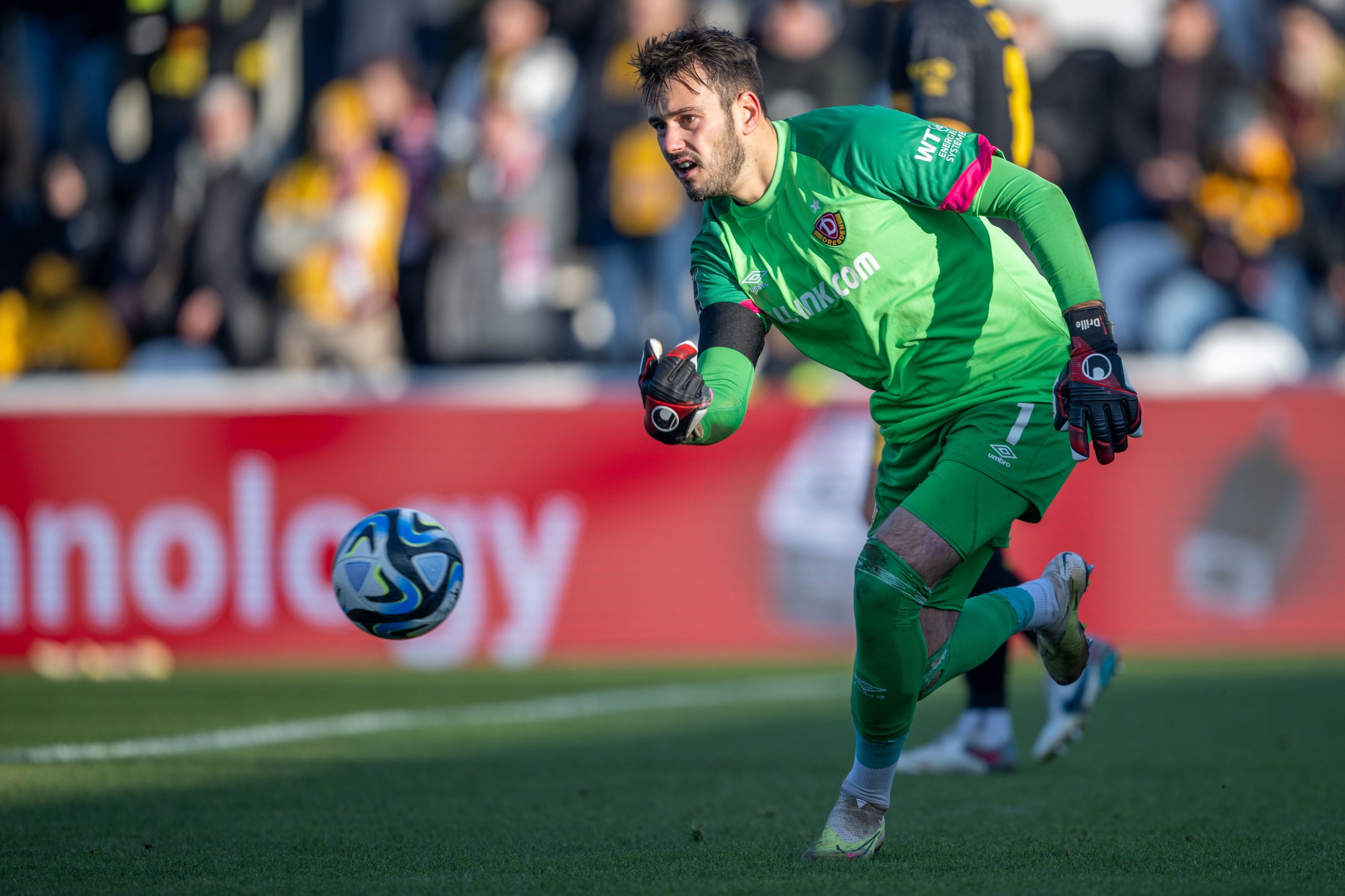Due to the promotion of the second team to the 3rd league, securing a starting spot for Dennis Seimen, and the departure of Florian Schock, the position of third goalkeeper became available at VfB. Fabian Wohlgemuth filled it with Stefan Drljača from Dynamo Dresden, who gathered third-league experience there and at Dortmund II. We gathered insights from Saxony and the Ruhr region.
Being a third goalkeeper is a rather thankless position: a lot has to happen for you to get playing time since there are two competitors ahead of you in the professional team and you’re not planned for the second team. Nevertheless, Stefan Drljača chose this path. Equipped with a contract until 2027, he is expected to challenge Fabian Bredlow and strengthen the goalkeeper team overall. Born on April 20, 1999, in Homburg, Saarland, Drljača is the son of former Regional- and Oberliga player Nenad Drljača and started his football journey with the local former Bundesliga club, where his father also played as a libero. In his youth, he switched to Saarland rival Elversberg, where he even played in the Junior Bundesliga. He left Saarland for Hoffenheim for the under 19, where he won the league title and reached the cup semi-finals, and in 2018 moved up to the Regionalliga team.

Now you will read a lot of familiar names: At Hoffenheim II, he replaced Dominik Draband, who played nine games for VfB II last season, and encountered Alexander Stolz, who was with VfB from 2005 to 2011, and Gregor Kobel. When Kobel transferred to VfB after a six-month loan to FC Augsburg in 2019, Drljača established himself as the first goalkeeper of Hoffenheim’s reserve team before the season was halted in March 2020. During the COVID-19 break, at 21, he moved to Borussia Dortmund, where he was to compete with Luca Unbehaun for the goalkeeper position of the then fourth-tier second team and sit on the bench as the fourth goalkeeper for the pros. The duel with Unbehaun proved to be very balanced, with Drljača playing 14 season games for the eventual promoted team and sitting on the bench for several Bundesliga and Champions League matches. Originally, according to BVB youth expert Klaus Pablo Torgau, the plan was to put pressure on Unbehaun, but due to Unbehaun’s injury susceptibility, Drljača ultimately replaced him and established himself as the number one, even though he had fewer appearances in the second half due to bench duties with the pros. In a season that BVB II finished in 9th place, Drljača and Unbehaun delivered “a duel at a very good third-league level,” according to Klaus.
Strong after the world cup break
In 2022, he changed clubs, but only minimally changed club colors, moving to Dynamo Dresden, which had just been relegated from the second league. Klaus explains that the move wasn’t surprising since Drljača had no perspective in the first team and, at 23, wasn’t necessarily planned for the second team squad due to age regulations. Klaus and the creators of the Dynamo fan podcast also reported that VfB had already shown interest in him given Florian Müller’s poor performances. At Dynamo, Drljača initially had difficulties. Although he prevailed over Sven Müller from Halle, he lost his starting spot shortly before the 2022 World Cup break. In the winter, Dynamo even brought back Kevin Broll from Zabrze, which motivated Drljača to reclaim his spot in the second half of the season. Also, according to the podcasters, he physically improved during the World Cup break. In the end, he played 34 of 38 games and again prevailed over Broll in the summer of 2023. Although Dynamo missed out on promotion to the second league with 6th and 4th places in the last two years, Drljača developed into a strong support until a muscle bundle tear sidelined him early this year: “The record year 2023 for Dresden was also reflected in his performances.”
Now he will take on a new role at VfB, with Klaus believing he could potentially displace Fabi Bredlow as number 2. However, at just 25, primarily sitting on the bench is rather unusual, even though the 3rd league might be “too much to die and too little to live” for someone with his qualities in the long run. In Dresden, it’s believed he can adapt to the new role. If he does get a chance to play, we can expect, according to the experts, a goalkeeper with strong reflexes on the line. While the Dynamo podcast notes his weaknesses with the ball at his feet but allows for development, Klaus recalls differently from his time in Dortmund and sees more room for improvement in the air and considers him a solid second-league goalkeeper, as do the podcasters. They especially praise his resilience after setbacks. Drljača felt very comfortable in Dresden, spent a lot of time with the fans, and was emotionally farewelled accordingly.
VfB made a good move with Drljača, nicknamed “Drille,” given the clear situation in goal. Apparently, they have more confidence in him than in Flo Schock, though it remains to be seen if we’ll ever see him in goal. Interestingly, like Chabot, he used the World Cup break to make a sporting comeback. For team chemistry, it certainly won’t hurt if he shares this experience.
Picture: © Thomas F. Starke/Getty Images for DFB

